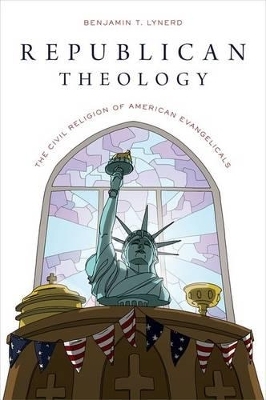
Republican Theology
The Civil Religion of American Evangelicals
Seiten
2014
Oxford University Press Inc (Verlag)
978-0-19-936356-8 (ISBN)
Oxford University Press Inc (Verlag)
978-0-19-936356-8 (ISBN)
Since the founding, American evangelicals have espoused a civil religion that sees limited government as a condition for a thriving church. This "republican theology," however, also accentuates the church's capacity to elevate civic virtue.
As an electoral bloc, contemporary white evangelical Christians maintain a remarkable ideological and partisan conformity, perhaps unmatched by any other community outside of African Americans. Historically, evangelicals have supported various political parties, but their approach to civil religion, or the way that they apply the spiritual to the public realm, has, as Republican Theology argues, been consistent in its substance since the founding of the nation. Put simply, this civil religion holds that limited government and a free-market are essential to the cultivation of Christian virtue, while the livelihood of the republic depends on the virtue of its citizens. While evangelicals have long promoted conservative moral causes, from temperance and anti-obscenity in the nineteenth century to abstinence education in the twentieth, they have also aligned themselves on many other seemingly unrelated agendas: in support of the Revolution in the 1770s, on antislavery in the 1820s, against labor unionism in the 1880s, against the New Deal in the 1930s, on assertive anticommunism in the 1950s (a major theme in Billy Graham's early sermons), and in favor of deregulation and lower taxes in the 1980s.
As Benjamin T. Lynerd contends, the rise of the "New Right " movement at the end of the twentieth century had as much to do with small-government ideology as with a recovery of traditional morality. This libertarian ethos combined with restrictive public moralism is conflicted, and it creates friction both within the New Right alliance and within the church, particularly among evangelicals interested in social justice. Still, it has formed the entire subtext of evangelical participation in American politics from the 1770s into the twenty-first century. Lynerd looks at the evolution of evangelical civil religion, or "republican theology " to demonstrate how evangelicals navigate this logic.
As an electoral bloc, contemporary white evangelical Christians maintain a remarkable ideological and partisan conformity, perhaps unmatched by any other community outside of African Americans. Historically, evangelicals have supported various political parties, but their approach to civil religion, or the way that they apply the spiritual to the public realm, has, as Republican Theology argues, been consistent in its substance since the founding of the nation. Put simply, this civil religion holds that limited government and a free-market are essential to the cultivation of Christian virtue, while the livelihood of the republic depends on the virtue of its citizens. While evangelicals have long promoted conservative moral causes, from temperance and anti-obscenity in the nineteenth century to abstinence education in the twentieth, they have also aligned themselves on many other seemingly unrelated agendas: in support of the Revolution in the 1770s, on antislavery in the 1820s, against labor unionism in the 1880s, against the New Deal in the 1930s, on assertive anticommunism in the 1950s (a major theme in Billy Graham's early sermons), and in favor of deregulation and lower taxes in the 1980s.
As Benjamin T. Lynerd contends, the rise of the "New Right " movement at the end of the twentieth century had as much to do with small-government ideology as with a recovery of traditional morality. This libertarian ethos combined with restrictive public moralism is conflicted, and it creates friction both within the New Right alliance and within the church, particularly among evangelicals interested in social justice. Still, it has formed the entire subtext of evangelical participation in American politics from the 1770s into the twenty-first century. Lynerd looks at the evolution of evangelical civil religion, or "republican theology " to demonstrate how evangelicals navigate this logic.
Benjamin Lynerd holds the Benjamin Franklin Project Post-Doctoral Fellowship at the Illinois Institute of Technology in Chicago.
Introduction ; Chapter 1: Evangelicals as Lockeans ; Chapter 2: Republican Theology ; Chapter 3: Covenantal Origins ; Chapter 4: American Foundations ; Chapter 5: Entrenchment in the Second Great Awakening ; Chapter 6: Darwin as Ally, Social Gospel as Foe ; Chapter 7: The Triumph of Free Market Theology ; Epilogue ; Notes ; Index
| Erscheint lt. Verlag | 13.11.2014 |
|---|---|
| Verlagsort | New York |
| Sprache | englisch |
| Maße | 161 x 236 mm |
| Gewicht | 354 g |
| Themenwelt | Geisteswissenschaften ► Geschichte ► Regional- / Ländergeschichte |
| Geisteswissenschaften ► Religion / Theologie ► Christentum | |
| Sozialwissenschaften ► Politik / Verwaltung | |
| ISBN-10 | 0-19-936356-0 / 0199363560 |
| ISBN-13 | 978-0-19-936356-8 / 9780199363568 |
| Zustand | Neuware |
| Haben Sie eine Frage zum Produkt? |
Mehr entdecken
aus dem Bereich
aus dem Bereich
Erinnerungen
Buch | Softcover (2024)
Pantheon (Verlag)
16,00 €


